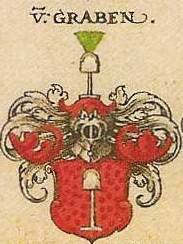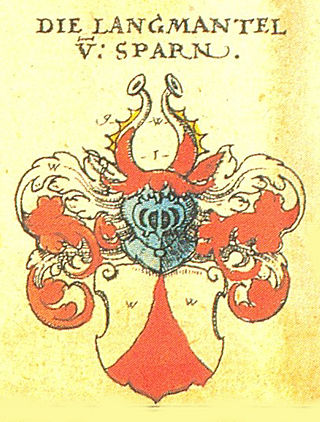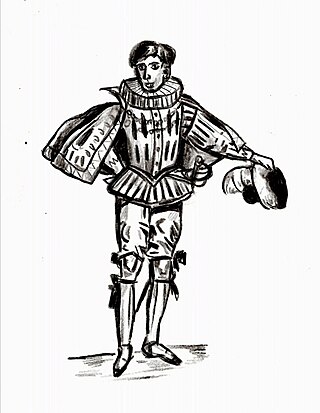
The office of Minister-President, or Prime Minister, of Prussia existed from 1848, when it was formed by King Frederick William IV during the 1848–49 Revolution, until the abolition of Prussia in 1947 by the Allied Control Council.

Virgil von Graben, also Virgil vom Graben, was an Austrian noble, politician and diplomat. He was one of the most important noblemen and officials in the County of Gorizia and in the Habsburg Empire of Frederick III. and Maximilian I.

Andreas von Graben zu Sommeregg was a Carinthian knight and nobleman residing at Sommeregg Castle. He served as a burgrave and castellan governor in the Ortenburg estates, held by the Counts of Celje until 1456. With the extinction of the Cillier family, Von Graben lost the post of captain of the County of Ortenburg under the Habsburgs, their successors as Ortenburg sovereign.
Rosina von Graben von Rain, also called Rosina von Rain, was an Austrian noble woman, a member of the Graben von Stein family and heiress of the burgraviate of Sommeregg Castle in Carinthia.

Herren von Graben, also named von (dem) Graben, vom Graben, Grabner, Grabner zu Rosenburg, Graben zu Kornberg, Graben zu Sommeregg, Graben von (zum) Stein, and ab dem Graben was the name of an old (Uradel) Austrian noble family.

Bibran-Modlau was a Silesian noble family which was raised to Reichsfreiherr 1624.

Frederick II von Graben, also called Frederick the Younger, was a Styrian noble, a member of the edelfrei Von Graben family. He held the titles as Lord of Kornberg and Marburg, the Lordship Marburg as well as burgrave of Riegersburg. One of the most affluent Styrian nobles, Frederick was an advisor to the Habsburg emperor Frederick III, where he held a special position, assessor at the Reichskammergericht, and member of the duchy's Landtag assembly.

Ulrich III von Graben was a member of the Austrian nobility, Lord of Kornberg, (Ober)Radkersburg, Grabenhofen, Graben and the Lordship Marburg, Obermarburg and Maribor Castle.
The Deutsche Theatrum Chemicum is a collection of alchemical texts, predominantly in German translation, which was published in Nuremberg in three volumes by Friedrich Roth-Scholtz (1687–1736), the publisher, printer and bibliographer.

The State Academy of Fine Arts Stuttgart is a university in Stuttgart, Germany. It was founded in 1761 and has been located on the Weissenhof since 1946. Its campus consists of three buildings: the Altbau, Neubau 1 or "Architects' Building", and Neubau 2.

Christoph Langenmantel or Christoph Langenmantel vom Sparren was a nobleman, Carmelite friar, canon of Freising and a supporter of Martin Luther.

The Ernestine Gymnasium is a humanistic and modern gymnasium in Gotha, Germany, the successor of the Illustrious Gymnasium, founded in 1524, which in 1853 was merged with the recently founded Real-Gymnasium Ernestinum, named in honour of Ernest I, Duke of Saxe-Coburg and Gotha. The merged school continued to be known as the Ernestinum. Until 1947, when it was closed, it was considered the oldest gymnasium in the German-speaking world. It was re-founded in 1991, shortly after German reunification.

Leopold Grabner zu Rosenburg, Pottenbrunn and Siebenbrunn, also Leopold Grabner , during his lifetime Leopold Grabner zu Rosenberg, was a nobleman of the Archduchy of Austria below the Enns. During the Reformation, Grabner was one of the leading Protestants in the country, a deputy of the estates and councillor. Under him, Rosenburg castle became a center of Austrian Reformation history.

Sebastian II Grabner zu Rosenburg und Pottenbrunn, also Sebastian von Grabner or Sebastian Grabner the Younger, was a nobleman of the Archduchy of Austria under the Enns.

Georg Grabner zu Rosenburg und Zagging was a nobleman of the Archduchy of Austria under the Enns in the age of the Reformation.